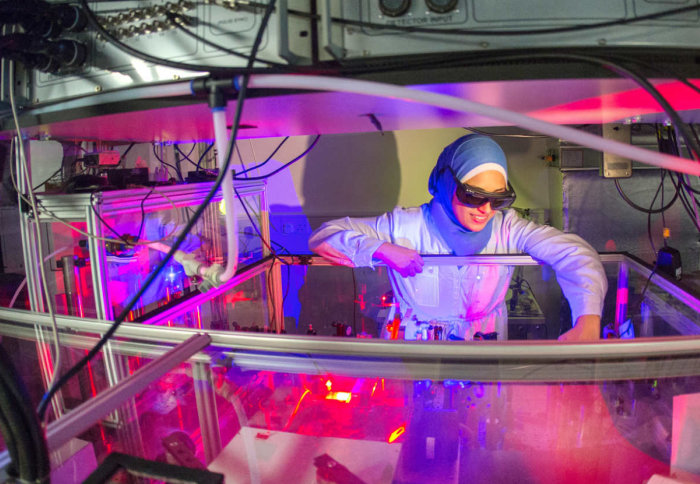New Network of Excellence in Ultrafast Science launches with full day of talks

PhD student Noura Zamzam working on the 'Spitfire' laser system.
A new Network of Excellence, Frontiers of Ultrafast Measurement, launched at Imperial on 16 May 2019 with day of exciting ultrafast science seminars.
The [Ultra] network, which is hosted by the Department of Life Sciences, is a multi-faculty network, with co-directors Professor John Tisch and Professor Jon Marangos from the Physics Department, and Professor David Dye from Materials. There are also members from the Department of Chemistry and the Faculty of Medicine.
Imperial has vast expertise in ultrafast science. The Network aims to assist this community and promote interactions and collaborative projects. Jasper van Thor Professor of Molecular Biophysics
At the launch, director of the network, Professor Jasper van Thor, emphasised the cross-disciplinary nature of ultrafast research at the College: “Imperial has vast expertise in ultrafast science, present in multiple faculties and departments. The [Ultra] network has been created to assist this community and to promote interactions and collaborative projects.
In the beginning we are going to focus on organizing events putting the science front and center, such as the full day of talks organized for the kick-off meeting.”
The kick-off event was opened by the Provost Professor Ian Walmsley, who is also a contributing member of the [Ultra] network. The day of talks had contributions from both internal and external speakers, covering and representing broad and varied areas of ultrafast science. The keynote seminar, entitled “Mapping Atomic Motions with Ultrabright Electrons: Fundamental Space-Time Limits to Imaging Chemistry and Biology”, was given by Professor Dwayne Miller, director of the Max Planck Institute for Structure and Dynamics of Matter.
The Network's Mission
The excellence and variety of research within the Network...has already seeded ideas for new collaborations within the college and beyond. John Tisch Professor of Laser Physics
The Network's central focus is on structural dynamics and ultrafast phenomena. Fundamental dynamical processes in matter are of key interest to many communities, ranging from plasma physics, materials science, biophysics and femtochemistry, attosecond science, radiation processes and medical physics. Whilst the frontier topic of attosecond/few-femtosecond dynamics will be a part of our remit we will also address other frontiers of ultrafast dynamics, for example, in complex materials and biological systems, where the relevant timescales may be slower. The network is thus intended to support, and promote collaborations between, research areas operating at all these research frontiers where our ability to fully resolve dynamics and structural dynamics is crucial to progress.
The [Ultra] Network will strengthen existing internal collaborations and build new bridges between experimentalists and theoreticians working in areas with strong intellectual and technical overlap. These involve ultrafast pump-probe applications of Angstrom wavelength X-ray free electron lasers, plasma physics, ultrafast optical lasers and particle accelerators, quantum chemistry and theoretical physics.
Professor van Thor emphasised how the idea for the Network evolved from pools of existing expertise at the College: “The case was immediately clear when we discovered activities and areas of ultrafast research within the various faculties and departments that we realised should directly benefit from being organised in a network”.
The Network will enhance the already vibrant community of ultrafast scientists at Imperial and provide opportunities for exchange of ideas, equipment and people to enable scientific advances. Jon Marangos Lockyer Chair in Physics
Professor Tisch agreed that the new network provides a fantastic opportunity to consolidate and further develop the College’s very strong and wide-ranging activities in ultrafast science and technology: “the excellence and variety of research within the Network was clearly evident at the kick-off meeting, which has already seeded ideas for new collaborations within the college and beyond”, he said.
Professor Tisch and Dr Artem Bakulin (Chemistry) have already successfully applied for some funding from the Network to host a half-day meeting on “Ultrafast lasers for material science applications” to be held on 18 June in White City. Though principally a scientific meeting, Professir Tisch added that it would also have representation from the ultrafast laser industry, with a view to building strategic partnerships between industry and the College - “exactly the kind of outcome we hope from this Network”.
Professor Marangos said: “This is an enormously exciting time for ultrafast science with new attosecond sources of X-rays, femtosecond sources of electrons for UED and a plethora of laser based techniques all now available to us. The Network will enhance the already vibrant community of ultrafast scientists at Imperial and provide opportunities for exchange of ideas, equipment and people to enable scientific advances.”
Watch again
Imperial's Provost, Professor Ian Walmsley, formally opened the [Ultra] network, after which Professor Jasper van Thor gave a brief introduction before welcoming the keynote speaker, Professor Dwayne Miller:

Find out more
Visit the [Ultra] Network website for more information and to find out how to get involved.
Article text (excluding photos or graphics) © Imperial College London.
Photos and graphics subject to third party copyright used with permission or © Imperial College London.
Reporter
Jasper van Thor
Department of Life Sciences
Claudia Cannon
The Grantham Institute for Climate Change